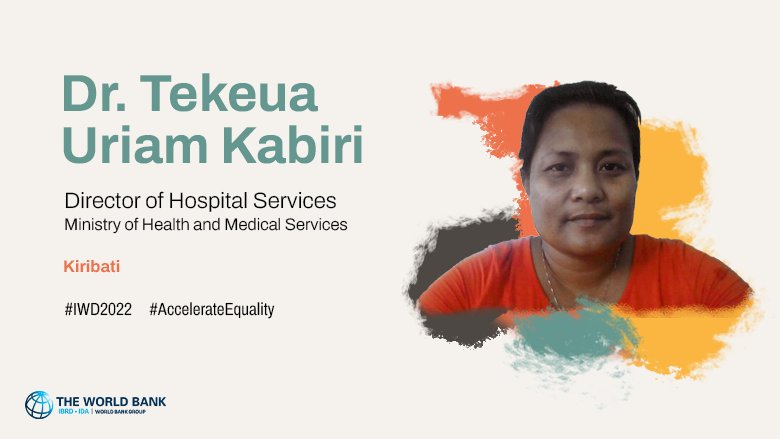It's a lot to do with faith. I grew up in a religious family and I try to do good and help others. When I was in high school, I wanted to become a nun and doctor at the same time, but God had other plans for me. I became a doctor because I wanted to improve health outcomes so families can provide and be around for their loved ones.
If you could describe yourself in three words, what would they be?
Faithful, compassionate, and driven to see positive changes.
In Kiribati, we are seeing rising numbers of communicable diseases, such as pneumonia, hepatitis, and skin infections. Non-communicable diseases, like diabetes and high blood pressure, are also prevalent. There are also geographic challenges. We must distribute supplies to outer islands in a timely manner, which can be challenging as our islands are scattered across the ocean. The referral hospital is on the main island. This creates challenges when it comes to emergency health situations and making sure patients can reach the main island.
A lot of energy has gone into COVID-19 preparations since 2020. Our health systems had to perform COVID-19 and non-COVID functions simultaneously. Staff constraints meant that we learned how to organize ourselves. But COVID-19 comes with a lot of sacrifice if you are a healthcare worker on the frontline. You must leave your family and spend long hours at the hospital.
However, COVID-19 has also brought resilience and collectiveness in our team. A lot of staff are coming down with the virus, which means we are working in a shrinking team. Yet, the team has still been very strong, taking a few days rest and coming back to assume duties. The solidarity of the team gives me strength to continue for my team, our patients, and our own families that we are protecting and treating during this outbreak.
I joined the health field 14 years ago. I am honored to take up this new challenge as Director for Hospital Services, overseeing the clinical and allied clinical teams, and the health care services. The different team members work together with a common goal for better standards. Working alone would not achieve much. The highlight is gaining the confidence and the support of the team.
The first challenge is leading as a woman. The elders, the men, rule in our culture. It was challenging to lead team members who are more senior than me, and those who are male. Some of the male staff still have traditional mindsets. I am always conscious of this. I maintain the respect of seniors through my respectful tone and gestures, and listening.
Another challenge is family time. I have a lot less family time compared to work time. My kids always ask me when I will finish work. With the COVID-19 pandemic, long hours are even longer at the hospital. I always make the best use of weekend time with my kids and family. I tell myself that if I don't put the effort into my work I’m playing with my family’s health as well. That keeps me focused.
What Kiribati really needs is very simple: family and education. I deeply thank my mum and dad because I owe my success to them. Families provide culture, love, faith, respect, wisdom and support the education of their kids. I have six sisters, and all are educated. Some are in government leadership positions. Kiribati needs family units that are loving, responsible and supportive. I'm trying my best to do this with my kids too.
The little good we do each day, each week, each month and over the years adds up and doesn't go unrecognized. This is one powerful way we earn trust, respect, and confidence from those around us.
I must also acknowledge the Ukrainian women and mothers who are going through the toughest moments of their lives. They are being forced apart from their husbands to take care of their families. Our prayers and our thoughts are with you. Be strong and have faith and continue to do the good things that you've done for your families. We pray for this war to end.
**The views expressed in this interview do not necessarily represent the views of the World Bank Group.

